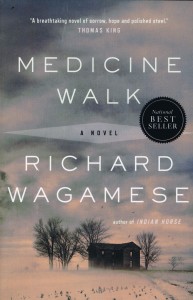 I discovered Richard Wagamese serendipitously, when the kindly woman at the local big-box bookstore recommended him. He is an Ojibway, a member of the Wabaseemong First Nation people of Ontario – though he currently lives in British Columbia – who has published seven novels, a memoir and a collection of his journalism from the Calgary Herald. He grew up in foster homes in Ontario before his eventual adoption, and I suspect – in that bad habit readers fall into, of reading the life into the work – that this rootlessness has informed much of his writing, for Medicine Walk tells the story of Franklin Starlight, a young Native boy whose father abandoned him from a young age, leaving him to be raised by a kindly old (non-Native) man.
I discovered Richard Wagamese serendipitously, when the kindly woman at the local big-box bookstore recommended him. He is an Ojibway, a member of the Wabaseemong First Nation people of Ontario – though he currently lives in British Columbia – who has published seven novels, a memoir and a collection of his journalism from the Calgary Herald. He grew up in foster homes in Ontario before his eventual adoption, and I suspect – in that bad habit readers fall into, of reading the life into the work – that this rootlessness has informed much of his writing, for Medicine Walk tells the story of Franklin Starlight, a young Native boy whose father abandoned him from a young age, leaving him to be raised by a kindly old (non-Native) man.
Franklin’s life without his father, and with no knowledge of his mother, is difficult. He leaves school at 16, finding no use for any subject without practical application to his life on the farm and in Canada’s wilderness. He did not learn his father’s name, Eldon Starlight, until he turned 7, and even then it had no meaning for him, just “four blunt syllables conjuring nothing.” His father visits only occasionally, and never for very sentimental reasons. “When he appeared, the kid would watch him and whisper his name under his breath, waiting for a hook to emerge, a nail he could hang context on, but he remained a stranger on the fringes of his life.” The few times Franklin visits his father in his distant town, he finds him drunk, often incoherent, and shamefully inattentive. Wagamese is a gifted storyteller, above all, and he depicts these painful meetings with consummate skill. We see, for example, the drunken Eldon so beholden to the bottle that he cannot last an entire fishing trip with his son without sneaking sips of hard liquor. In another painful scene, he forgets about his son’s visit entirely, bringing a prostitute into his room as his infant son sits quietly in the dark, neglected.
In the novel’s present, however, Eldon makes a request of his son that offers the possibility of redemption. He is dying of a failing liver, and wants to be given a warrior’s death, buried sitting up, deep in the forest, and for this he requires his son’s help. In his father’s absence, and with the guidance of his surrogate father, Franklin has developed a passion for the outdoors and a mastery of the skills needed to survive in the wild. There is nothing mystic about Medicine Walk, but there is a great appreciation for the outdoors that shades into the spiritual, what the old man repeatedly calls the mystery. Here is how Wagamese describes Franklin’s passion for nature and this mystery:
When he stood out on the land he could feel it. It lay in the sense of being hollow and serene like he had felt after he shot the buck. It was in the sure heft of the gun in the crook of his arm and the knowledge that he could take what he needed and use it. Most of all, it was in the process of tracking game letting himself slip out of the bounds of what he knew of earth, and outward into something larger, more complex and simple all at once. He had no word for that. Asked to explain it, he wouldn’t have been able to, but he understood how it felt against his ribs when he breathed night air filled with the tang of spruce gum and rich, wet spoil of bog. That particular magic that existed beyond words, beyond time, schools, plans, lofty thinking and someone else’s idea of what mattered.
It’s perverse to say, but nonetheless true: the great benefit of absent parents, of unknown origins, is freedom, the freedom to invent oneself entirely, to freely choose your passions, and Franklin is fortunate to find strength and identity through his skills as an outdoorsman.
Their walk into the woods becomes the springboard for a larger story, the story of Eldon Starlight’s origins: his father’s death in World War II, his mother’s subsequent abandonment of him in favor of an abusive boyfriend, and – most painful of all – the story of his coupling with Franklin’s mother, and her eventual death. The woods, Wagamese repeats constantly, provide anything a man needs, and the old man, Franklin’s adoptive parent, has a particular expression for the gathering of healing herbs: medicine walk. So Eldon’s final request, his last chance to share a real experience with his son, becomes, for both men, a form of redemption. Franklin learns about his origins, and the cause of his father’s alcoholism and inability to be a parent; Eldon is able to unburden himself, and atone for his failures as a father.
Medicine Walk is a rare achievement, blending masterful storytelling with a prose style that is authentic and vital, capable of sustaining the weight of the narrative as it expands to suit Wagamese’s purpose.